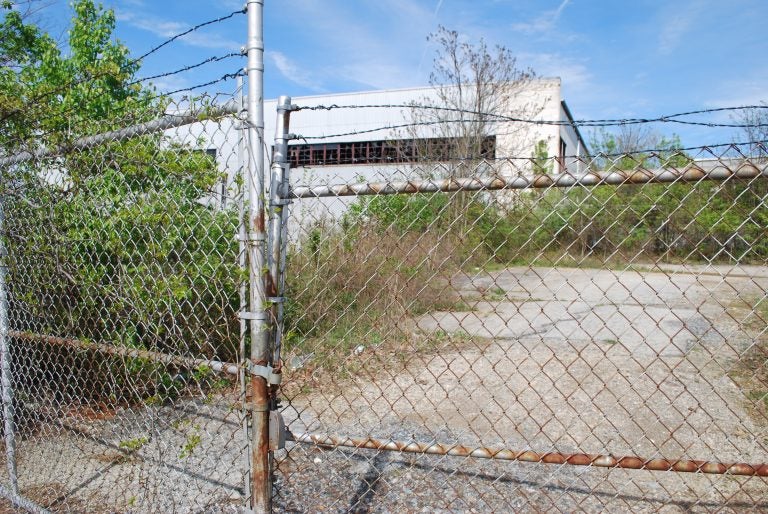Contaminated Chester County site still mired in legal fights over redevelopment plan
An environmental group sued the township in mid-March, saying that its conditional approval of the project endangers public health and violates its own rules.

The contaminated Bishop Tube former industrial site in Malvern, Pa. Environmentalists say DEP has neglected the cleanup over many years. (Jon Hurdle/StateImpact PA)
This story originally appeared on StateImpact Pennsylvania.
___
A fight over plans to build houses on a heavily contaminated industrial site in Chester County appears to be nowhere near resolution more than 15 years after the land was purchased by the developer.
Any prospect that the shuttered Bishop Tube site in East Whiteland Township could be cleaned up and reused any time soon receded last month when an appeals court struck down an agreement between the developer, Constitution Drive Partners, and the Department of Environmental Protection, leaving the company open to the threat of legal action by the state.
Meanwhile, an environmental group sued the township in mid-March, saying that its conditional approval of the project endangers public health and violates its own rules.
And the DEP says it is up to six months away from specifying the cleanup standards that the developer would have to meet before executing its plan to build 86 town homes on the 14-acre site that is polluted with a number of toxic chemicals, including trichloroethylene (TCE), a carcinogenic chemical that was used as a degreaser in the pipe-making plant.
Neither the township nor the company returned phone calls seeking comment on the Commonwealth Court’s latest ruling.
The derelict site, which closed in 1999, has been a source of health concern for a community that fears local cases of cancer are related to the presence of toxic compounds in the air, water and soil near the plant.
Kathleen Stauffer, who has lived about 100 yards from the site since 1986, suspects that she breathed in airborne toxins when pregnant with her daughter, Elizabeth, who was born in 1990 and has battled three brain tumors since she was 16.
“TCE is airborne, and breathed in by a woman who’s pregnant, it could affect the fetus,” Stauffer said. “She was diagnosed at 16; doctors suspect that it was slow-growing in her since birth.”
Elizabeth, now 31, was treated with chemotherapy and radiation, and has been free of tumors since she was in high school, and is able to live a normal life, her mother said.
“We’re very lucky because when it comes to brain tumors, survivorship is slim, and having a normal life is even slimmer,” said Stauffer, who is a plaintiff in two lawsuits filed against the DEP and the township by Delaware Riverkeeper Network, an environmental group that has led community opposition to the redevelopment plan.
In 2008, the federal Agency for Toxic Substances and Disease Registry called the site “heavily contaminated” with chlorinated solvents, acids and heavy metals including TCE at thousands of times above Pennsylvania’s health standard. The agency also identified an underground “plume” of chlorinated solvents in aquifers beneath the site and beyond.
In 2016, the ATSDR urged the developer to consider non-residential uses for the site, given the toxicity of its contaminants. If the proposed residential development goes ahead, the agency recommended expanded site assessment and remediation, and the installation of systems to mitigate air vapors.
“Even very low levels of trichloroethylene, the primary chlorinated solvent contaminant at the site, may be harmful, and great care must be taken to not allow exposures to occur,” the agency said then.
Maya van Rossum, leader of DRN, predicted that the ongoing health concerns plus its legal challenges against the township and the DEP make any early resolution of the marathon case highly unlikely.
“In terms of development, that is not a near-term option,” she said.
She accused the DEP of failing to clean up the site despite signing a “prospective purchaser agreement” with Constitution Drive Partners when the company bought the site in 2005, and of caving in to the developer’s demands. CDP is a unit of O’Neill Properties, which specializes in redeveloping former industrial sites.
“It’s very clear that the DEP was working very hard to put forth an agreement that would allow the developer to accomplish everything that he wanted without regard to the environment, the community and future families that would move to this toxic site,” she said. “That’s a sweetheart deal when you give, give, give as an agency to the industry so that they can accomplish their profit goals and put everybody else at risk.”
The agreement, which was amended in 2007 and 2010, protected the company from legal action by the DEP, but it was invalidated in early March by the Commonwealth Court, which said the agency failed to allow public comment on the deal for at least eight years, violating the state’s Hazardous Sites Cleanup Act.
The delay had deprived the public of the opportunity to make meaningful comment on the agreement, the court said, upholding an earlier ruling by the Environmental Hearing Board.
Virginia Cain, a spokeswoman for the DEP, said the department does not comment on litigation that may result in an appeal.
She said the DEP has received a remediation report from a consultant for the previous owners of the site and will use that and other information over the next six months to produce its requirements for cleanup standards.
“Until DEP has proposed and then selected its final remedial response action(s) for the site, DEP cannot speculate as to what requirements will have to be met before remedial activities commence there and who will perform the work,” Cain said.
The consultant, Roux Associates, said that any houses built on the site will have the potential for “inhalation exposure” of volatile organic compounds in indoor air, and that it assumes future uses of the site will be non-residential.
Whatever the DEP’s requirements turn out to be, they are among the conditions set by East Whiteland Township for its approval of the redevelopment plan, issued in February. It requires, among other things, remediation of soils to DEP standards in three “hot spots” on the site where contamination is at its highest, and the installation of vapor-mitigation systems on any homes within 100 feet of groundwater where volatile organic chemicals exceed the standards of Pennsylvania’s Act 2 land-recycling law.
In a suit filed against East Whiteland in the Chester County Court of Common Pleas on March 11, DRN said the township had violated some of its own ordinances in approving the redevelopment plan. It said remediation and construction on the site would disturb contaminants, exposing construction workers and the surrounding community to dangerous chemicals, and that future residents of the proposed town homes would be at risk unless the site was fully remediated.
“Without full property remediation in accordance with a plan approved by the DEP, the proposed earthwork and grading in the plan will create a condition of increased exposure of contaminants during construction and after construction of the project,” the complaint said.
In a suit against the DEP in 2017, DRN seeks a court order to require the department to clean up the site after what DRN called the agency’s “manifest neglect and dilatory conduct” over the years.
WHYY is your source for fact-based, in-depth journalism and information. As a nonprofit organization, we rely on financial support from readers like you. Please give today.






